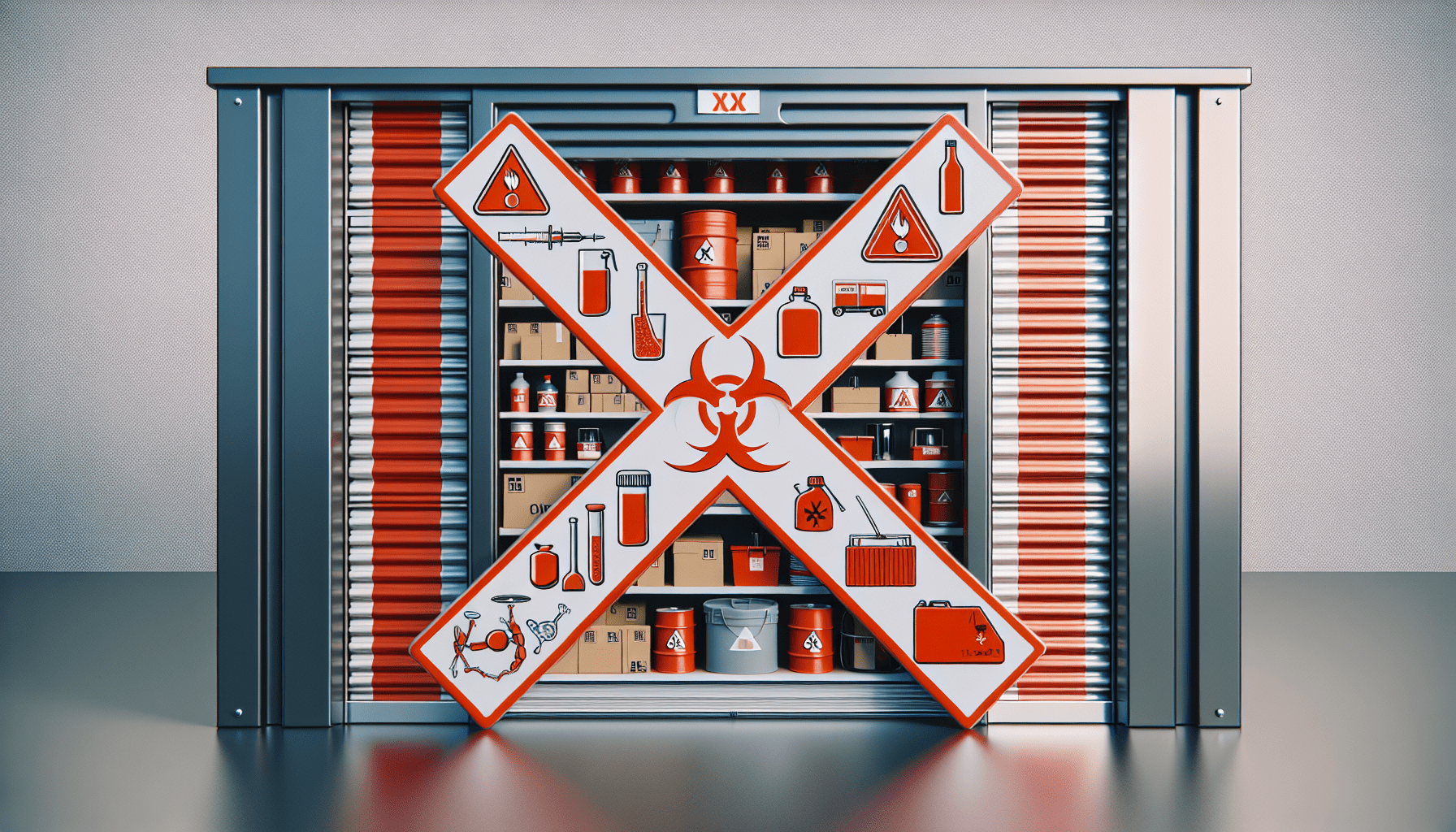Hey there! When it comes to storing your belongings, it’s important to know what items are safe to keep in a storage unit and what items are better left elsewhere. In this article, we will discuss what items you should avoid putting in a storage unit to ensure the safety and integrity of your belongings. Let’s dive in and make sure you’re storing your items the right way! What Shouldn’t You Put In A Storage Unit?
What shouldn’t you put in a storage unit?
Why is it important to know what not to store in a storage unit?
It’s important to understand what items are not suitable for storage units so that you can avoid damage, potential hazards, or even legal issues. By being aware of what shouldn’t be stored in a storage unit, you can ensure the safety of your belongings and prevent any problems in the future.
Items that are prohibited in storage units
Storage facilities typically have rules and restrictions on what can be stored in their units. Here are some common items that are prohibited in storage units:
Hazardous materials
Storage units usually prohibit the storage of hazardous materials, including:
- Explosives
- Flammable liquids
- Chemicals
- Biohazards
- Radioactive materials
Storing hazardous materials in a storage unit can pose serious risks such as fire, explosion, and contamination. It’s essential to follow regulations and guidelines to ensure the safety of yourself and others.
Perishable items
Perishable items such as food, plants, and animal products should not be stored in a storage unit. These items can attract pests, cause unpleasant odors, and create health hazards. It’s best to consume or dispose of perishable items before placing them in storage.
Living organisms
Living organisms, including pets and plants, should not be kept in storage units. These items require proper care, adequate light, water, and ventilation, which are unavailable in a storage facility. Find alternative arrangements for living organisms to ensure their well-being.
Firearms and ammunition
Storage units typically have rules against storing firearms and ammunition due to safety concerns. They can be dangerous if mishandled or stored improperly. Keep firearms and ammunition in a secure and legal location that complies with regulations.
Items that require climate-controlled storage
Certain items are sensitive to environmental factors such as temperature, humidity, and light. These items are best stored in climate-controlled storage units to prevent damage or deterioration. Here are some examples of items that require climate-controlled storage:
Electronics
Electronics, such as computers, televisions, and audio equipment, are susceptible to damage from extreme temperatures and humidity. Store electronics in a climate-controlled unit to maintain optimal conditions and extend their lifespan.
Musical instruments
Musical instruments, such as pianos, guitars, and violins, are sensitive to temperature and humidity fluctuations. Climate-controlled storage ensures that the instruments are preserved in the best condition and stay in tune.
Antiques and collectibles
Antiques, collectibles, and artwork are valuable items that can be damaged by changes in temperature and humidity. Climate-controlled storage protects these items from deterioration, warping, fading, or mold growth.
Important documents and photos
Important documents, photos, and memorabilia can be damaged by moisture, heat, or pests. Store these items in a climate-controlled unit to preserve their quality, readability, and longevity.
Tips for storing items safely and efficiently
To make the most of your storage unit and keep your belongings safe, follow these tips:
Use sturdy boxes and containers
Use high-quality boxes and containers to store your items securely. Label each box with its contents to easily locate items when needed. Stack boxes and containers safely to maximize space and prevent them from toppling over.
Wrap fragile items properly
Wrap fragile items, such as glassware, dishes, and ceramics, in bubble wrap or packing paper to prevent breakage. Fill empty spaces in boxes with packing peanuts or newspaper to cushion items during transport and storage.
Disassemble furniture and appliances
Disassemble furniture and appliances, such as tables, chairs, and cabinets, before storing them in a storage unit. Keep screws, bolts, and small parts in labeled bags to reassemble items later. Cover furniture with protective materials to prevent scratches or damage.
Arrange items strategically
Organize items in your storage unit by category or frequency of use. Place frequently used items at the front for easy access and less hassle. Use shelving units or pallets to keep items off the floor and prevent moisture damage.
Leave space for ventilation
Allow space between items in your storage unit for ventilation to prevent mold, mildew, and musty odors. Avoid cramming items too close together, as it restricts airflow and increases the risk of humidity buildup.
Invest in a good-quality lock
Secure your storage unit with a durable padlock or combination lock to deter theft and unauthorized access. Choose a lock that is resistant to cutting, picking, or tampering for added protection. Check your lock regularly to ensure it is in good condition.
Conclusion
Knowing what items to avoid storing in a storage unit and how to store items properly can help you maintain the condition and safety of your belongings. By following rules and guidelines, choosing the right storage facility, and using best practices, you can protect your items and ensure peace of mind. Make informed decisions about what to store and how to store them to make the most of your storage unit experience.
